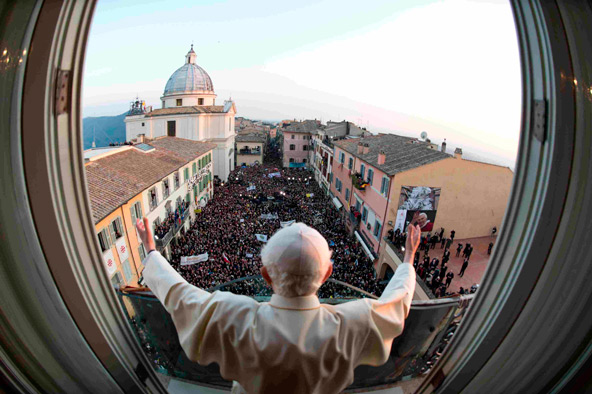

As the world welcomes a new pope, Catholics around the Diocese of Phoenix reacted to the first resignation of a pontiff in six centuries.
St. Thomas the Apostle parishioner Timothy Herman, who teaches courses through Ave Maria University, specializes in patristics and fundamental theology. Herman lived and studied for years in Rome and said Benedict XVI’s resignation is a good thing.
“He is a person who has demonstrated time and time again that he thinks very carefully about these matters, so if he has an opinion that it’s time for him to retire in order that somebody [else] can respond more effectively to the issues of the time, I trust him on that,” Herman said.
The move also demonstrates Benedict’s ability to think in line with the Church and a certainty that the Holy Spirit will continue to lead the Church in the right direction, Herman said.
In 2005 when then-Cardinal Ratzinger was elected pope, Herman said he remembers the observation of one of the pontiff’s friends.
“He said, ‘We have just elected a man with the intellect of nine professors and the devotion of a 10-year-old boy making his [First Holy] Communion,’” Herman said.
Fr. William Schmid, parochial administrator at St. Mary Magdalene Parish in Gilbert, wrote his master’s thesis on the former pontiff’s Christology. He said Benedict was one of his heroes and that meeting him was one of the greatest moments of his life.
“I was always impressed with his boldness and his clarity,” Fr. Schmid said. “His approach to understanding God got me excited about the faith and excited about my own personal relationship with the Lord that I have through the Church.”
While on summer break from seminary, Fr. Schmid said he read Benedict’s writings and was deeply affected by them.
“Pope Benedict XVI is very much a spiritual father to me,” Fr. Schmid said. “He has brought me to an encounter with Christ that has formed the way I understand the world and my faith. I would not be the man — or the priest — I am today without him.”
Kendra Setlow, a parishioner at St. Helen in Glendale, said she became a Catholic at the Easter Vigil in 2006. Benedict was her first pope. Yet during the RCIA process, she admired the man then known as Cardinal Joseph Ratzinger.
“I was so touched by the beauty of his intellect,” Setlow said. “I didn’t want just a feel-good conversion.”
Benedict, Setlow said, showed her the “beauty and the depth of the Catholic faith and how highly intelligent and smart it is, going all the way back to the early Church Fathers.”
The former pope, Setlow said, is a “wise father who has been far more genteel and wise beyond anything people imagined.” His legacy, she said, will be long-lasting.
Fr. Schmid agreed. Benedict’s legacy, he said, includes his three-volume work on Jesus of Nazareth; his emphasis on the liturgy, which has given rise to a renewed sense of reverence for the Eucharist; and his continuation of the promotion of the New Evangelization as envisioned by Blessed John Paul II.
“I don’t think he made that decision [to resign] on a whim — I think he really prayed about it,” Fr. Schmid said. “I think it’s a sign of his humility, humbly recognizing that he can’t live up to the task anymore physically.”
The resignation, Fr. Schmid said, is also a sign of Benedict’s brilliance.
“He understands that there may come a point in the future that if he doesn’t resign now, he won’t be able to resign,” Fr. Schmid said. “In a way, probably because he’s still sharp intellectually, he probably understands that he’s making a decision based on reason, so the Church can continue to thrive.”






